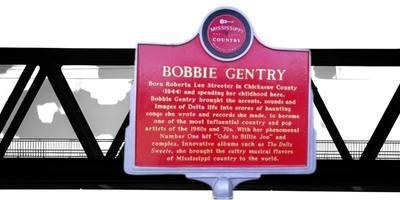It’s been 50 years since Billie Joe McAllister jumped off the Tallahatchie Bridge. Or at least since Bobbie Gentry sang about it, intriguing listeners not only as to why he jumped but what other revelations in the song had to do with it…if anything. And Gentry was never much help clearing the mysteries.
In an interview with the Oxnard Press Courier after the ballad’s 1967 release, Gentry discussed what became the fictional story’s most nagging questions – what had Billie Joe and the song’s narrator tossed from the bridge in the days before his suicide and why is that detail included?
“It’s in there for two reasons,” the songwriter said. “First, it locks up a definite relationship between Billie Joe and the girl telling the story, the girl at the table. Second, the fact that Billie Joe was seen throwing something off the bridge – no matter what it was – provides a possible motivation as to why he jumped off the bridge the next day.”
She told some interviewers that she did know what was thrown off the bridge and why Billie Joe jumped, but at other times she said she had no clue. Gentry, who wrote, produced and recorded the haunting tale, has lived privately since voluntarily leaving the music industry in the 1970s when she was at the peak of her multifaceted career, so there’s little chance that definitive answers will come.
“What was thrown off the bridge really isn’t that important,” she said in a decades-old interview. “Everybody has a different guess about what was thrown off the bridge – flowers, a ring, even a baby. Anyone who hears the song can think what they want, but the real message of the song, if there must be a message, revolves around the nonchalant way the family talks about the suicide. They sit there eating their peas and apple pie and talking, without even realizing that Billie Joe’s girlfriend is sitting at the table, a member of the family.”
Gentry recorded the song in a mere 40 minutes, accompanying herself on guitar with backup instruments being two cellos and four violins. The release was meant to be the flip side of “Mississippi Delta,” but DJs liked the ballad. It sold 750,000 copies in its first week and unseated the Beatles “All You Need Is Love” to reach No. 1 on the charts, where it stayed four weeks. Gentry won three Grammy Awards for the song, including one for Best New Artist, making her the first Country singer to win in that category.
The tragic tale, which Gentry called “a study in unconscious cruelty,” takes place in rural Carroll County, Mississippi, located in the Mississippi River delta. Choctaw Ridge was a real place, and until its collapse in 1972, the Tallahatchie Bridge crossed the river at Money, Mississippi. After the song’s release, so many people decided to jump off the bridge, which was only 20’ above the water, that a law was enacted fining jumpers $100.
Born in 1944 as Roberta Lee Streeter, Gentry grew up in Chickasaw County, Mississippi. Most small, rural Southern communities are replete with stories like Billie Joe’s and with people like the family who so casually discussed the young man’s death over the mid-day meal.
Papa says, “Well, Billie Joe never had a lick of sense,” and without pause asks for the biscuits and says, “There’s five more acres in the lower forty I’ve got to plow.”
Mama comments that “nothing ever come to no good up on Choctaw Ridge.”
Brother, apparently a close acquaintance, recalls the time he, Billie Joe and another boy put a frog down the narrator’s dress at the movies, mentions he had seen Billie Joe at the sawmill the day before and asks the narrator if she had been talking to Billie Joe at church the previous Sunday. Like his father, his comments are punctuated by requests for food to be passed.
It seems that only the narrator has no appetite, which Mama notices but does not question with concern. Instead she discloses that the young preacher dropped by and has been invited to Sunday dinner. It is inferred that he was the bearer of the bad news and also a piece of gossip.
“Oh, by the way,” Mama says. “He said he saw a girl that looked a lot like you up on Choctaw Ridge, And she and Billie Joe was throwing somethin’ off the Tallahatchie Bridge.”
Within a year Mama would be depressed about the loss of Papa to a deadly virus. Brother would be married to Becky Thompson and own a store in Tupelo. The narrator is spending her time at the scene of Billie Joe’s death. One wonders what happened to the farm that was so busy only a year before when Papa had acres to plow and there was cotton to pick and hay to bale.
In the last half century the song has been recorded by other Country artists as well as artists from other genres, and several parodies have been released. It’s been translated into German, Swedish and French and recorded by international stars who modified the lyrics for a more local flavor. Author Herman Raucher was commissioned to write a 1976 book and screenplay based on the song. He met with Gentry who told him that she did not know the answers, so he wove a story for dramatic purposes that provided answers he invented.
As for the ballad itself, no one but the narrator will ever know the whole truth – perhaps not even Gentry.
– story by Claudia Johnson, Country Reunion Music © 2022

